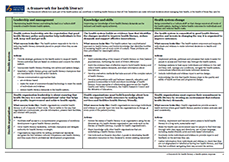
Summary
A framework for health literacy: a health system response
Because of the way health systems are organised, individuals and whānau can often face a series of demands on their health literacy (see Health literacy demands below). This is their capacity to obtain, process and understand basic health information and services in order to make informed health decisions.
A health-literate health system reduces these demands on people and builds health literacy skills of its workforce, and the individuals and whānau who use its services. It provides high-quality services that are easy to access and navigate and gives clear and relevant health messages so that everyone living in New Zealand can effectively manage their own health, keep well and live well.
Purpose
The Ministry of Health developed this framework because it is committed to a health system that enables everyone living in New Zealand to live well and keep well. Building health literacy is an important part of this, and the framework outlines expectations for the health system, health organisations and all of the health workforce to take action that:
- supports a ‘culture shift’ so that health literacy is core business at all levels of the health system
- reduces health literacy demands and recognises that good health literacy practice contributes to improved health outcomes and reduced health costs.
Using the framework
To get this framework working in the health system, it is necessary to build leadership and knowledge of health literacy approaches. In this way, the health system can make the long-term and sustainable changes needed to become health literate. The framework also identifies some success indicators that individuals and whānau can expect to see from every point of contact with the health system.
Health literacy demands – what are they?
Health literacy demands are tasks individuals and whānau need to do to get well and keep well, and those created at points of contact with health services. For example, tasks may include:
- arranging appointments: understanding a letter and its instructions, making a phone call to confirm, arranging time off work and transport to attend
- attending appointments: navigating an unfamiliar environment to find a service, interacting with reception staff, answering questions, providing a history and personal details, and understanding health practitioners’ instructions about tests, medications and follow-up appointments.
